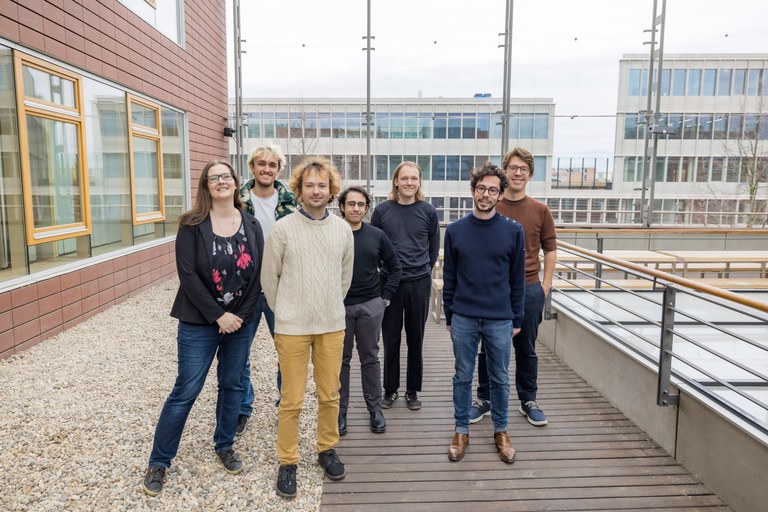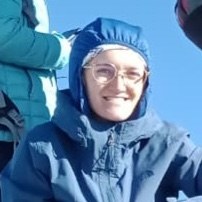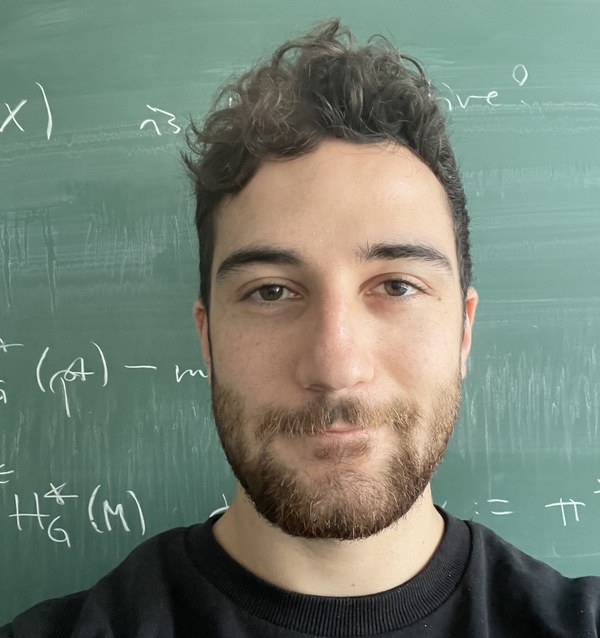Research group Prof. Dr. Gaetan Borot

In our group, mathematical physics is often practiced as a part of mathematics which can take inspiration from (but is not limited to) theoretical physics or aims at providing a rigorous understanding of physical models, in particular those coming from quantum field theory or string theory in which a mathematical framework (or even: definition) is lacking. This covers a rich array of techniques and problems, from combinatorics and algebra, geometry and topology, representation theory, probability and functional analysis, with an emphasis on their interrelations.
Recent publications
Mathematical physics seminar
SoSe23: Tuesdays 11am-1pm, BMS Seminar room, Haus 1, RUD 25, Adlershof
New PhD students


Current PhD students
Davide Scazzuso
Raum 1.328
All genera topological recursion on Seiberg-Witten curves, gauge theories, topological strings
Niklas Martensen
Raum 1.328
Geometric quantisation from spectral curves and non-perturbative wave functions
Silvia Ragni
Raum 1.33x
Moduli space of curves, integrable systems, enumerative geometry
Lasse Merkens
Raum 1.328
Algebraic structures for statistical physics on random 2d lattice
Former PhD students
Giacomo Umer - May 2025
Algebraic structures in enumerative geometry from topological recursion
Master dissertations
Florian Götz - Master Math. HU - Jan. 2023
Spectral networks and the geometry of surfaces
Niklas Martensen - Master Math. HU - Juli 2023
Non-perturbative topological recursion and geometric quantisation
Kanishka Katipearachchi - Master Math. - Januar 2025
Earthquakes in hyperbolic geometry
Johannes Hübers - Master Math. HU - Februar 2025
Non-perturbative Schwinger-Dyson equations in supersymmetric gauge theories
Leonard Vetter - Bachelor Info-Math-Phys - Aug. 2023
Topological recursion and open-closed TQFTs
Jonas Lautenschläger - Bachelor Physik - Dez. 2023
Lp-regularity of the Poisson equation (supervised by Barbara Zwicknagl)
Lea Polonyi - Bachelor Physik - Jan. 2024
Cluster algebras (supervised by Pedro Tamaroff)
Julian Komaromy - Bachelor Info-Math-Phys - Jul. 2024
Hurwitz numbers
Yoshua Hempel - Bachelor Phys - Nov 2025
Statistical physics models from the geometry of Riemann surfaces
Interns
Thomas Buc-d'Alché - Master Math., ENS Lyon (WiSe 2021-2022)
Integrability in matrix models and applications to algebraic geometry
Inès Combes-Castex - Bachelor Physik, Université de Toulouse (SoSe 2022)
Matrix models as a toy model in QFT, statistical physics on the random lattice
Maïté Carli - Master Math., Universität Bonn (Aug.-Sept. 2023)
Fractional fields in Liouville CFT (supervised by Guillaume Baverez)
Anna Hollands - Master Math., Universite Paris Sorbonne (Jan.-Feb. 2024)
Topological recursion, intersection theory and Hurwitz numbers
Silvia Ragni - Master Math., Padova University (Oct. 2024-Mar. 2025)
Erasmus+
Cohomological field theories and Givental-Teleman reconstruction
Outreach (past and coming)
Lange Nacht der Wissenschaft
2nd July 2022: In which dimension do we live in ? (with Alessandro Valentino)
17th June 2023: Random matrices are everywhere.
Tag der Mathematik
6th May 2023, Hauptvortrag: Die Welt der partiellen differentiellen Gleichungen
A history of the domino problem
Around compositions of Michael Winter
13th Nov.-1st Dec. 2023: exhibition by Michael Winter and Mareike Yin-Yee Lee
22nd November 2023: public lecture by Jarkko Kari, concert by the Kali Ensemble
Visitors
Bruno Vallette, Universite Paris 13 (27 Feb.-3 Mar. 2022)
Stavros Garoufalidis, SUSTech and MPIM Bonn (2-5 Mai 2022)
Reinier Kramer, University of Alberta (24-27 Mai 2022)
Campbell Wheeler, MPIM Bonn (24-27 Mai 2022)
Elba Garcia-Failde, Universite Paris 6 (31 Mai-3 Jun. 2022)
Sergey Shadrin, University of Amsterdam (31 Mai-3 Jun. 2022)
Felix Leid, Universität des Saarlandes (31 Mai-3 Jun. 2022)
Séverin Charbonnier, Université de Genève (31 Mai-3 Jun. 2022)
Yvain Bruned, University of Edinburgh (28 Jun. 2022)
Alessandro Giacchetto, IPhT Saclay France (5-8 Jul. 2022)
Vincent Delecroix, Université de Bordeaux (29 Sep.-8 Okt. 2022)
Ran Tessler, Weizmann Institute (24-28 Okt. 2022)
Nezhla Aghaei, SDU Odense (24-25 Okt. 2022)
Arne van Antwerpen, Vrije Universiteit Brussels (8 Nov. 2022)
Jorgen Ellegaard Andersen, SDU Odense (27 Nov.-3 Dez. 2022)
Nicolas Orantin, Université de Genève (27 Nov.-3 Dez. 2022)
Bruno Vallette, Universite Paris 13 (24-27 Jan. 2023)
Alexey Bufetov, Leipzig Universität (6-7 Feb. 2023)
Martin Markl, Czech Academy of Sciences (7 Nov. 2023)
Murad Alim, Edinburgh University (21 Nov. 2023)
Yannik Schüler, Sheffield University (27-30 Nov. 2023)
Thomas Buc-d'Alché, ENS Lyon (3-9 Dez. 2023)
Pietro Longhi, Uppsala University (15-19 Jan. 2024)
Hugo Parlier, Université du Luxembourg (21-23 Jan. 2024)
Vincent Bouchard, University of Edmonton (21-30 Apr. 2025)
Danilo Lewanski, University of Trieste (14-21 May 2025)
